
IPCON 2025: Reviving Transpersonal Psychology Through The Decolonial Lens of Islamic Psychology
⦾ Conference Program Layout [Click to Download] …. ⦾ Scientific Sessions Layout [Click to Download] ….
Manuscript Preparation and Submission Guidelines
- Font: Use a legible font such as 12-point Times New Roman
- Line Spacing: Double-space all text, including headings, block quotes, references, and figure captions.
- Margins: Set 1-inch margins on all sides.
- Alignment: Text should be left-aligned with a ragged right margin. Do not justify text.
- Paragraph Indentation: Indent the first line of every paragraph by 0.5 inches.
- Page Numbers: Include page numbers in the top right corner of every page.
- Title: Center the title in bold, capitalizing major words (title case). Place the title about 3–4 lines down from the top of the page.
- Author Names: Below the title, include the names of the authors (first name, middle initial, last name).
- Affiliation: Include the institutional affiliation(s) directly under the author names. If there are multiple authors with different affiliations, list affiliations accordingly.
- Heading: The word “Abstract” should be centered and bold at the top of a new page.
- Length: Write a concise summary of the paper, typically between 250 and 300 words.
- Content: The abstract should provide an overview of the background, objectives, methods, results, and conclusions.
- Keywords: At the bottom of the abstract, include a list of 3–5 keywords (in italics), indented and labeled “Keywords:”
Introduction: The introduction begins immediately after the title (with “Introduction” heading). Introduce the topic, provide background, Literature review, and explain the study’s Rationale.
Headings: Use a consistent heading structure to organize content.
- Level 1: Centered, Bold, Title Case
- Level 2: Left-aligned, Bold, Title Case
- Level 3: Left-aligned, Bold Italic, Title Case
- Level 4: Indented, Bold, Title Case, Period. Start text on the same line.
- Level 5: Indented, Bold Italic, Title Case, Period. Start text on the same line.
Citations: Follow APA 7 citation style (e.g., Smith, 2020, Smith et al., 2023) in-text.
Methods: Describe the research design, sample, operational definition, and, instruments. Describe statistical methods used and specify computer program employed for this purpose.
Results: Present results in logical sequence in the text, tables, and illustrations.
Placement: Figures and tables can either be placed within the text close to where they are mentioned or at the end of the manuscript in separate pages.
Titles: Provide a number and a descriptive title (e.g., “Table 1: Demographic Data”).
Notes: For additional information (e.g., explanations, abbreviations), place table notes below the table or figure, italicized.
Discussion: Justify result findings sequentially one by one. While justifying the findings, cite references that support or negate the findings of your study in a logical way. Compare your findings with other similar studies carried out locally and internationally. In this section limitations and implications of study, recommendations, and conclusions drawn must be clearly mentioned.
Conflict of Interest: All authors should disclose any conflicts of interest. This can include any honoraria or grants, affiliations, credits and promotions, or any other connections—personal or professional—that might seem to have an impact on the text. Authors should still include this heading and write “none to declare” if there isn’t a conflict of interest.
Funding Disclosure: Disclosure of all funding sources and expenditures is required. Authors should still use this heading and put “none to declare” if there is no funding disclosure.
References
- Heading: The word “References” should be centered and bold.
- Order: Arrange references alphabetically by the author’s last name.
- Hanging Indent: Use a hanging indent of 0.5 inches for each reference entry.
- Style: Use APA 7th edition format for each reference. Common examples include:
- Journal Article:
Author, A. A., & Author, B. B. (Year). Title of the article. Title of the Journal, Volume(Issue), pages. https://doi.org/xxx
- Book:
Author, A. A. (Year). Title of the book. Publisher.
- Ensure that all elements, especially in studies involving human participants, follow ethical reporting standards (i.e., Institutional Review Board approval).
Aims of IPCON 2025
- To generate realization regarding the pervasiveness of colonial thought in academia.
- To propose an alternate lens to regard the paradigm of knowledge and human behavior which is decolonial and Islamic.
- To foster holistic understanding of psychology and benefit from recent discoveries as well as wisdom form Islamic tradition and sources.
Objectives of IPCON 2025
- Foster connections and collaborative research between national and international intellectuals in psychology, Islamic psychology, and decolonialism.
- Advance Islamic psychology by integrating modern psychological knowledge with Islamic principles and promoting a decolonial intellectual identity.
- Encourage culturally sensitive research to address psychological issues in Pakistan while promoting a positive view of Islam and Pakistani intellectual culture globally.
About Shifa Tameer-e-Millat University
Shifa Tameer-e-Millat University, a renowned institution in Islamabad affiliated with Shifa International Hospital, is dedicated to advancing knowledge and developing future leaders in health, engineering, business, and social sciences. The university upholds national values while meeting global academic and research standards.
About Clinical Psychology Department
The Department of Psychology at Shifa Tameer-e-Millat University provides a comprehensive curriculum blending theory and practice, preparing students for diverse careers in psychology. The department is affiliated with multiple centers, offering hands-on experience to enhance practical skills.
About ISIP
During the 2020 Covid-19 pandemic, ISIP (International Students of Islamic Psychology) was founded as a response to the challenges and opportunities presented by the global crisis. Originating from digital conversations among individuals passionate about Islamic Psychology, ISIP became a platform to connect people worldwide, share resources, and support the integration of Islamic principles in the field of psychology. The organization aims to revive Islamic Psychology, promote well-being, and provide educational and networking opportunities, with the vision of normalizing Islamic Psychology and addressing mental health issues globally.
ISIP Website: https://isip.foundation/

Dr. Bagus Riyono
President IAMP/HOD, Gadjah Mada university, Indonesia.

S. Jamaluddin Miri
Counselor/Co-founder of ISIP Gothenburg Psychotherapy Institute, Sweden

Prof Dr. Ghulam Rasool
Professor of Islamic Psychology, Charles Sturt University, Australia.

Prof Dr. Amber Haque
Director of Muslim Family Services, ICNA Relief USA,

Dr. Mahdi Qasqas
Licensed Psychologist, Qasqas & Associates Psychological Services, Edmonton, Canada

Prof Dr. M. Tahir Khalily
Dean FSSH Shifa Tameer-e-Millat University

Prof. Rahmattullah Khan
Hon Professor & Clinical Psychologist, Universiti Selangor Kuala Lumpur

Dr. Fahad Khan
Deputy & Clinical Director (National) Lombard, USA

Dr. Olga Pavlova
Associate Professor, HOD Ethnopsychology and problems of multicultural Education, MSUPE, Moscow
- Morality and Generosity
- Compassion and Services in Mental Health
- Spiritual wisdom, tazkiya and Insight/ Cultivation of wisdom
- Intentions and conscience
- Transformation of emotions in Islamic psychology
- Ecological Awakening
- Motivation and Coaching in Islamic psychology
- Islamic Perspective in Psychotherapy
- Islamic Perspective in Psychological Assessment
- Human Behavior and Islamic Science
- Suicide response and prevention in Islamic psychology
- Islam and psychology: A step towards Holistic wellness
- Islamic Psychology and Research Practices
- Islamic approach in clinical supervision and ethics
- Spiritual leaders and contemporary psychology
- Program development with De-colonial lens in Islamic psychology
- Decolonizing Psychological Practice and wellness promotion
- Epistemological Foundations
- Psycho-spiritual considerations in clinical settings
- Character development in Islamic perspective
Important Dates
- Abstract Submission Deadline:20th Oct, 2024
- Conformation for Abstract Acceptance: 20th Nov, 2024
Registration Fee
| Category | Registration Fee |
| STMU Participants | 1800/-RS |
| Other Participants | 2000/-RS |
| Presenter | 2500/-RS |
| Professional Participants | 3000/-RS |
List of Downloads
For Registration
Sr No | Name | |
1 | Dr Aneela Maqsood | |
2 | Dr Shazia Khalid | shazia.khalid@numspak.edu.pk |
3 | Dr Ziasma Haneef Khan | ziasmak@uok.edu.pk |
4 | Dr Ansa Qurat ul Ain | |
5 | Dr Muhammad Rizwan | |
6 | Dr Ghulam Rassool | Grassool@csu.edu.au
|
7 | Dr Sajida Naz | dr.sajida@fjwu.edu.pk
|
8 | Dr Humaira Jami |
|
9 | Dr Rabia Muhstaq | rabia.mushtaq@iiu.edu.pk
|
10 | ||
11 | Dr. Kehkashan Arouj | |
12 | Dr. Nelofar Kiran Rauf | nelofar@nip.edu.pk |
Patron-In-ChiefProf. Dr. M. Iqbal KhanVice Chancellor Shifa Tameer-e-Millat University |
PatronProf. Dr. M. Tahir KhalilyDean FSSH Shifa Tameer-e-Millat University |
Principal OrganizerDr. Neelam EhsanAssociate Professor – STMU |
Head of Scientific CommitteeDr. Tamkeen SaleemAssociate Professor – STMU |
Head of Pre-conference workshop committeeProf Dr. Uzma MasroorConsultant Clinical Psychologist – STMU |
|
Sample Slides
- [Click here] to download
Conference Program
- Coming Soon
Conference Proceedings
⦾ Conference Program Layout [Click to Download] …. ⦾ Scientific Sessions Layout [Click to Download] ….
Conference SecretaryDr. Fatima KhurrumClinic Manager/Lecturer Shifa Tameer-e-Millat University | Departmental Focal PersonMr. Muhammad AdeelDepartment Secretary Shifa Tameer-e-Millat University |
For more details of the conference or any query, please contact us at:
- Contact Number: 051-8840615
- Email: ipcon.dcp@stmu.edu
Pre-Conference Workshops
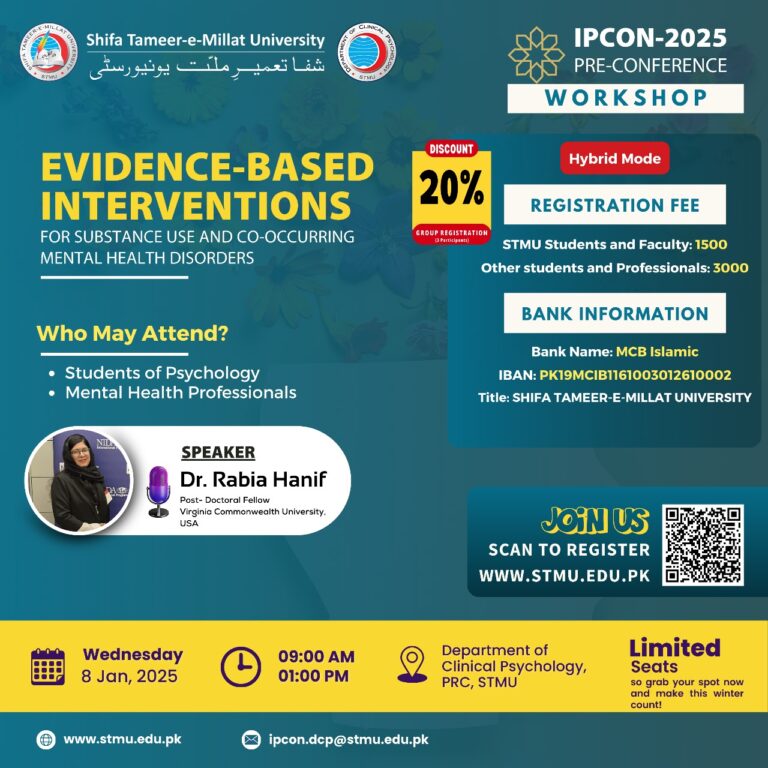
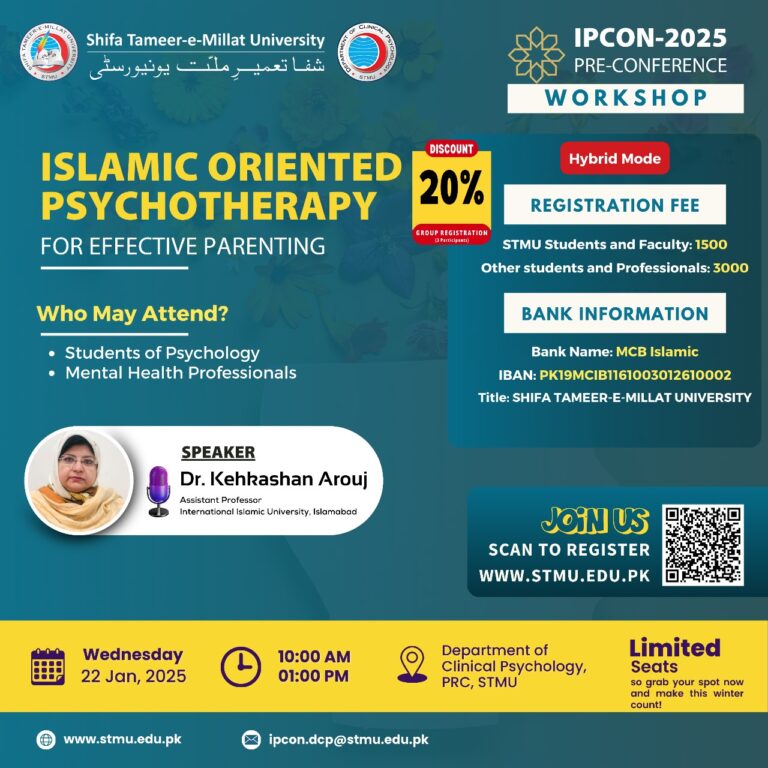
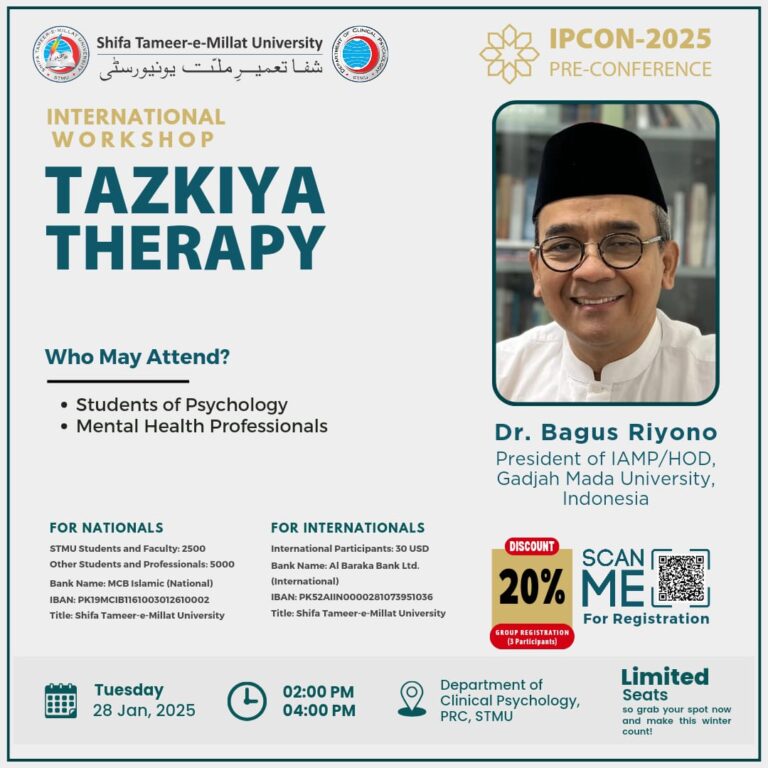
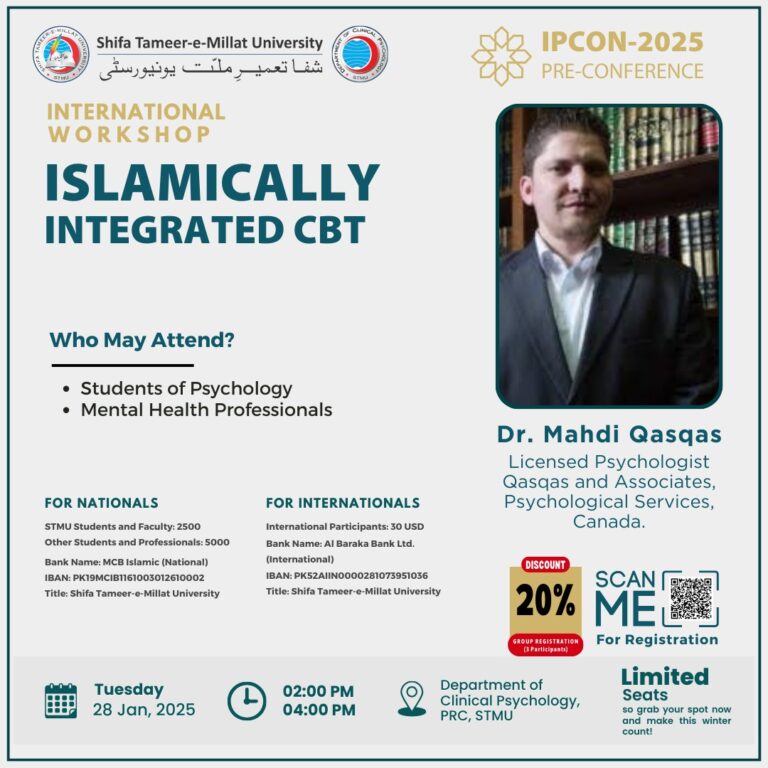
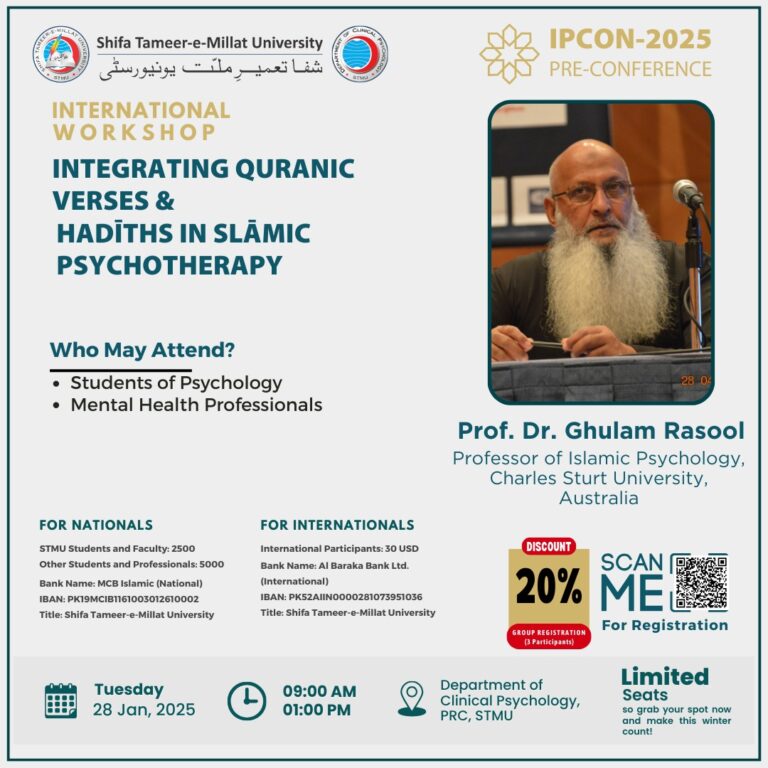
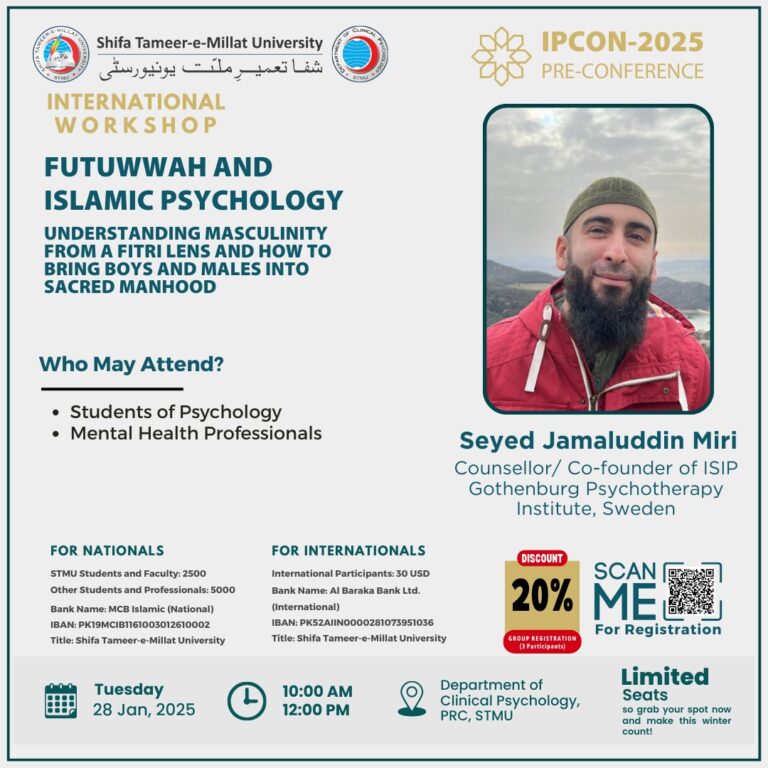
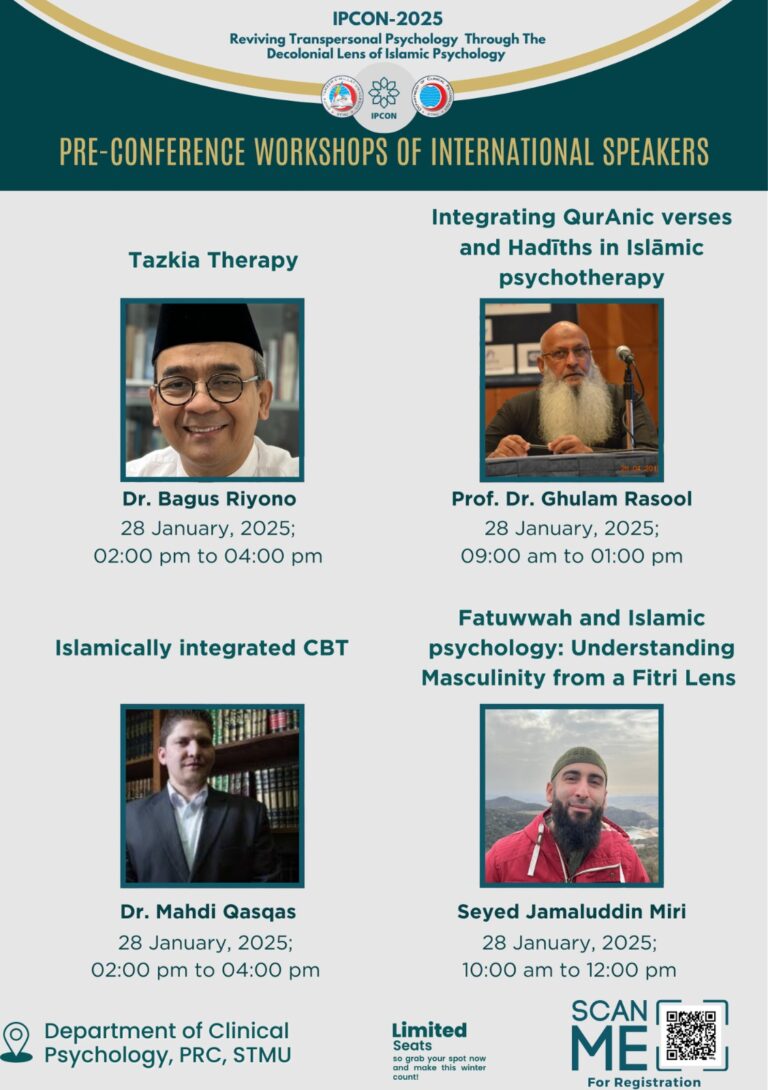
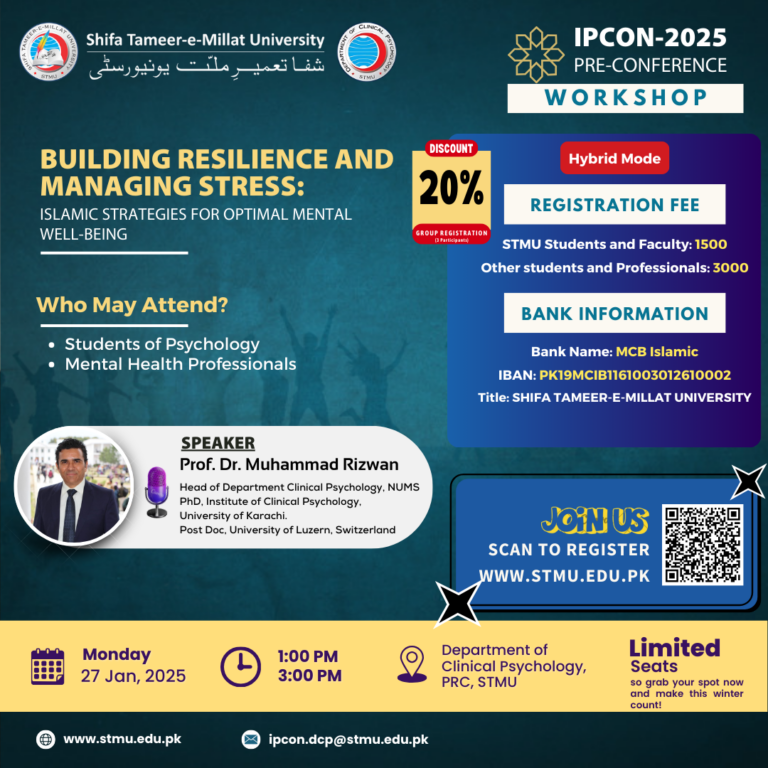
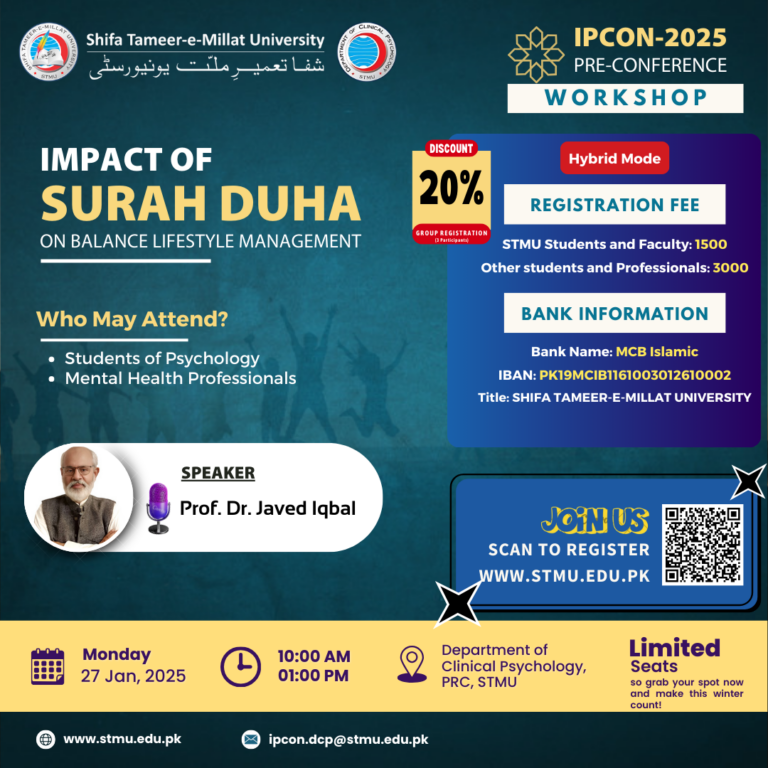
Frequently Asked Questions
The conference is open to students, researchers, mental health professionals, Islamic scholars, and anyone interested in Islamic psychology.
Registration details, including deadlines and fees, can be found through the university’s event portal. https://stmu.edu/ipcon-2025-reviving-transpersonal-psychology-through-the-decolonial-lens-of-islamic-psychology/
The registration fee typically covers conference materials, access to all sessions, refreshments, and meals during the event.
The conference addresses a wide range of themes, including morality, generosity, compassion in mental health services, spiritual wisdom, tazkiya, intentions, and conscience. It also explores the Islamic perspective on psychotherapy, psychological assessment, emotional transformation, suicide prevention, and holistic wellness. Additional topics include ecological awakening, motivation and coaching, decolonizing psychological practices, program development, character development, clinical supervision, and psycho-spiritual considerations in Islamic settings, with a focus on integrating Islamic science and psychology.
Yes, participants can submit their research abstracts for presentation. The submission guidelines are available on the official conference page.
The conference will be hybrid, allowing participants to attend both in-person and virtually.
The registration fee for STMU participants is 1,800 PKR.
Other participants need to pay 2,000 PKR to register for the conference.
Presenters are required to pay a registration fee of 2,500 PKR.
Professional participants will need to pay 3,000 PKR to register for the conference.
The deadline for abstract submission is 20th November 2024.
- Confirmation for abstract acceptance will be provided by 1st December 2024.
- Dr. Bagus Riyono (President of IAMP and HOD at Gadjah Mada University, Indonesia)
- Seyed Jamaluddin Miri (Counselor and Co-founder of ISIP Gothenburg Psychotherapy Institute, Sweden)
- Prof. Dr. Ghulam Rasool (Professor of Islamic Psychology at Charles Sturt University, Australia)
- Prof. Dr. Amber Haque (Director of Muslim Family Services, ICNA Relief USA)
- Dr. Mahdi Qasqas (Licensed Psychologist at Qasqas & Associates Psychological Services, Edmonton, Canada)
- Prof. Dr. M. Tahir Khalily (Dean of FSSH at Shifa Tameer-e-Millat University)
- Dr. Fahad Khan (Deputy and Clinical Director, Lombard, USA)
- Prof. Rahmattullah Khan (Hon Professor and Clinical Psychologist, Universiti Selangor, Kuala Lumpur)
To access the conference virtually, registered participants will receive a Zoom link via email prior to the event.
The conference schedule will be available on the official conference website and will be updated regularly to provide the latest information on sessions and speakers. Please check the website for any updates. https://stmu.edu/ipcon-2025-reviving-transpersonal-psychology-through-the-decolonial-lens-of-islamic-psychology/
Absolutely, students are encouraged to submit their research for either paper presentations or poster sessions.
Yes, there will be conference proceedings for accepted papers, providing an opportunity for participants to have their work published.
Yes, certificates will be provided for both participation and presentation.
The conference will take place at Shifa Tameer-e-Millat University, Park Road Campus, Islamabad-44000, Pakistan.
The participants are responsible for arranging their own accommodation for the conference. However a few recommended options are listed below:
- Serena Hotel Islamabad: A luxurious hotel located about 8 km from the university. It offers elegant rooms, fine dining, and recreational facilities.
- Marriott Hotel Islamabad: Approximately 7 km away, this hotel features comfortable accommodations, multiple restaurants, and a fitness center..
- Royal Swiss Hotel: Situated about 6 km from the university, this hotel offers modern amenities, a swimming pool, and several dining options.
- The Centaurus Serviced Apartments: This option is around 4 km from the university and offers a mix of hotel and apartment-style accommodations.
- Ramada by Wyndham Islamabad: Located about 5 km away, this hotel features comfortable rooms and a range of amenities.
- Embassy Lodge: A comfortable hotel option located approximately 8 km from the university, ideal for those attending the conference.
Affordable Hostels for Student Accommodation
- Abasyn Hostel for Girls and Boys: Hostel City,Park road
- Royal Hostel for Girls and Boys: Hostel City,Park road
- Punjab Boys Hostel: Lane 10, Street 5b, Royal Avenue, Park Road
No, travel or accommodation costs are not covered by the conference. Participants are responsible for arranging and financing their own travel and lodging expenses. For more details, you can refer to the conference’s official website or contact the organizers directly.
Yes, lunch and tea will be provided during the conference.
For any further questions regarding the conference, please contact Dr. Fatima Khurrum, the Conference Secretary, or Mr. Muhammad Adeel, the Departmental Focal Person, Shifa Tameer-e-Millat University at 051-8840615, or email ipcon.dcp@stmu.edu for additional details.
We kindly request that attendees adhere to professional and modest attire.
